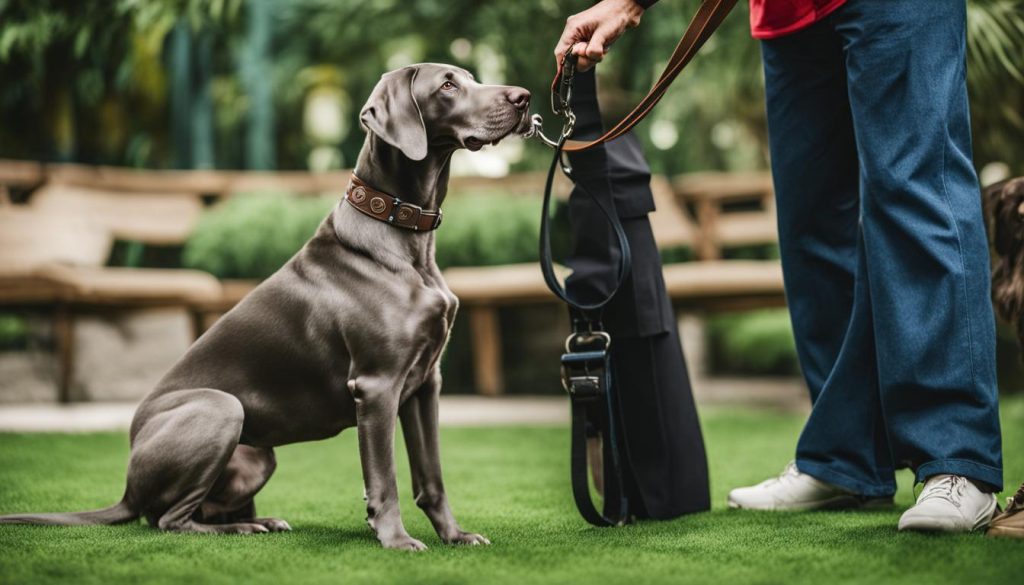Welcome to my guide on Weimaraner training! If you’re a proud owner of this energetic and intelligent breed, you may be looking for effective tips to train your Weimaraner and achieve great results. Whether you’re focusing on obedience training, behavior modification, or advanced techniques like agility or hunting training, this article will provide you with valuable insights and strategies.
Weimaraners are known for their energy and require ample exercise to thrive. They are a loyal and affectionate breed but may be better suited for homes with older children due to their exuberance. Without proper exercise and training, they may exhibit negative behaviors such as barking, chewing, and escaping.
Training a Weimaraner requires patience, consistency, and positive reinforcement. They are highly intelligent dogs and can catch on quickly with the right approach. However, it’s important to be aware of their prey drive and potential dominance issues with other dogs. Separation anxiety is also common among Weimaraners, so proper training and socialization are essential.
In this article, I will share top tips for puppy training, secrets to successful training, the importance of positive reinforcement, establishing leadership, and more. So, let’s get started and set your Weimaraner up for training success!
Learning Weimaraner Training
- Provide ample exercise for your Weimaraner to meet their physical needs.
- Consistency and positive reinforcement are key to successful training.
- Socialization is crucial for Weimaraners to develop appropriate behavior.
- Establishing leadership helps create a respectful and well-behaved dog.
- Set realistic expectations and celebrate milestones in your Weimaraner’s training journey.
Top 11 Tips For Weimaraner Puppy Training
Early training is crucial for Weimaraner puppies to establish boundaries and expectations. Consistency is key in training, ensuring that everyone in the household uses the same commands and rewards.
Positive reinforcement is an effective training technique for Weimaraner puppies. It involves rewarding desired behaviors with praise, treats, or playtime. This encourages the puppy to repeat those behaviors. Training sessions should be kept short and engaging to match the puppy’s attention span.
Clear and simple commands should be used to avoid confusion. Puppies learn at different paces, so patience is important. Socialization is essential for Weimaraner puppies to develop confidence and appropriate behavior. Interaction with other animals and people helps them learn how to behave in different situations.
Redirecting unwanted behaviors is more effective than punishment. Instead of scolding or punishing the puppy, guide them towards a more desirable activity. Establishing a strong foundation of basic commands like sit, stay, lie down, come, and leave it is important for obedience training.
Mental stimulation is vital for Weimaraner puppies. Engage their minds with puzzle feeders and interactive play sessions. This helps prevent boredom and destructive behaviors. Crate training is beneficial for housebreaking and providing a safe space for the puppy.
Gradually build independence to prevent separation anxiety. Start by leaving the puppy alone for short periods of time and gradually increase the duration. Physical exercise is essential for Weimaraner puppies, as they have high energy levels. Take them for regular walks and provide plenty of playtime.
Training aids like leads or long lines can be helpful in teaching proper leash manners. Preparation is key in training sessions. Have a plan of action and be ready with treats, toys, and other resources.
Supervised play sessions with other dogs can aid in socialization. It is important for Weimaraner puppies to learn how to interact appropriately with other dogs. Consistency, patience, and positive reinforcement are crucial in Weimaraner puppy training. By establishing a clear understanding of expectations and reinforcing positive behaviors, you can raise a well-behaved and happy Weimaraner.
- Start training early to establish boundaries and expectations.
- Use consistent commands and rewards among all household members.
- Utilize positive reinforcement by rewarding desired behaviors with praise, treats, or playtime.
- Keep training sessions short and engaging to match the puppy’s attention span.
- Use clear and simple commands to avoid confusion.
- Practice patience as puppies learn at different paces.
- Focus on socialization to build confidence and appropriate behavior.
- Redirect unwanted behaviors instead of punishing the puppy.
- Establish a strong foundation of basic commands like sit, stay, lie down, come, and leave it.
- Provide mental stimulation through puzzle feeders and interactive play sessions.
- Implement crate training for housebreaking and creating a safe space for the puppy.
Secrets to Successful Weimaraner Training
When it comes to training your Weimaraner, starting early is key to establishing boundaries and expectations. Consistency is crucial in training methods and commands to avoid confusion and ensure effective learning. One of the most important secrets to successful Weimaraner training is the use of positive reinforcement. By using praise, treats, or playtime to reward desired behaviors, you can create a positive training environment that motivates your dog.
During training sessions, it’s important to keep them short and engaging, as Weimaraners have varying attention spans. Using clear and simple commands will help your dog understand what is expected of them. Remember to be patient with your Weimaraner, as each dog learns at their own pace.
Socialization is another crucial aspect of Weimaraner training. Exposing your dog to various environments, people, and animals helps them develop confidence and appropriate behaviors. Redirecting unwanted behaviors rather than using punishment-based techniques is important for maintaining a positive relationship with your dog.
Setting realistic expectations is essential throughout the training process. Understanding that progress may take time and that each dog is unique will help you stay motivated and avoid frustration. It’s also important to avoid using punishment-based training techniques, as they can harm the bond between you and your Weimaraner.
To prevent unwanted behaviors such as chewing or chasing, teach your Weimaraner commands like “leave it” and “drop it.” These commands will help redirect their attention to more appropriate activities. Additionally, online dog training courses can provide professional guidance and support throughout your training journey.
By applying these secrets to successful Weimaraner training, you can establish a strong bond with your dog and create a well-behaved and happy companion. Remember to maintain clear communication, show leadership, and use positive reinforcement to make the training experience enjoyable for both you and your Weimaraner.
Establishing Leadership in Weimaraner Training
Establishing leadership is crucial in Weimaraner training to create a stable and respectful relationship. Dogs are hierarchical animals and need to understand their place in the pack. Consistency in training methods and expectations helps establish leadership.
- Set clear behavior boundaries: By setting clear boundaries and rules, you can prevent disobedience and unwanted behaviors. Weimaraners need to understand what is expected of them and what is considered acceptable behavior.
- Respect and enforce the rules: It is important to respect the boundaries you have set and enforce them consistently. When your Weimaraner follows the rules, make sure to reward and reinforce their good behavior.
- Address disrespectful behaviors: If your Weimaraner displays disrespectful behaviors, such as ignoring commands or challenging your authority, it is essential to address them immediately. Do not allow these behaviors to become habits.
Establishing leadership in training promotes a harmonious and well-trained Weimaraner. By setting clear boundaries and enforcing them consistently, you can create a strong relationship with your dog based on trust and respect.

The Importance of Positive Reinforcement in Weimaraner Training
Positive reinforcement is a powerful tool in Weimaraner training. It involves rewarding desired behaviors with praise, treats, or playtime. This approach helps the dog associate good behavior with positive outcomes, making them more likely to repeat the action.
By using positive reinforcement, we build trust between the dog and the trainer, creating a positive training environment. This trust is crucial for effective communication and cooperation during training sessions. When a Weimaraner feels safe and secure, they are more willing to learn and follow instructions.
Punishment-based training techniques should be avoided as they can damage the bond between the dog and the trainer. Weimaraners are sensitive dogs, and harsh punishments can lead to fear and anxiety, inhibiting their ability to learn. It’s important to remember that training should be a positive experience for both the dog and the trainer.
Emphasizing positive reinforcement not only helps shape desired behaviors but also builds a strong and long-lasting bond between you and your Weimaraner. By using rewards such as praise, treats, or playtime, we create a positive association with training and motivate the dog to continue learning and behaving in a desirable manner.
Positive reinforcement training not only helps in obedience training but also aids in addressing behavioral issues such as separation anxiety, aggression, and fearfulness. By rewarding calm and confident behaviors, we can help the Weimaraner overcome their fears and improve their overall well-being.
Rewards in Training
- Using treats as rewards for desired behaviors
- Praising the dog enthusiastically for their achievements
- Engaging in playtime or rewarding with toys
Building Trust
- Creating a safe and positive training environment
- Establishing a strong bond between the dog and the trainer
- Encouraging open and clear communication
Avoiding Punishment
- Avoiding harsh punishments that can lead to fear and anxiety
- Focusing on redirecting unwanted behaviors instead of punishing them
- Choosing positive alternatives to correct the dog’s behavior
By prioritizing positive reinforcement in Weimaraner training, we can create a well-behaved and happy dog who is motivated to learn and eager to please. Remember, building a strong foundation of trust and using rewards to reinforce positive behaviors is key to a successful training journey.
The Role of Consistency in Weimaraner Training
Consistency is a vital element in the successful training of Weimaraners. Whether it’s training methods, commands, or rewards, consistency is key to avoid confusion and reinforce learning. One of the fundamental aspects of consistency is ensuring that all family members use the same training techniques and commands. This uniformity in approach allows the Weimaraner to understand and respond consistently to the desired behaviors.
In addition to consistent training methods, maintaining consistent training sessions and schedules is essential. By providing regular and structured training, you set clear expectations for your Weimaraner and reinforce their learning over time. Consistent training sessions also help to establish routines, which provide a stable and predictable environment for your dog.
Consistency in training promotes effective communication between you and your Weimaraner. By using consistent commands, you help the dog understand what is expected of them more easily. This clarity reduces confusion and increases the likelihood of desired behaviors becoming a habit for your Weimaraner.
Avoiding inconsistency and mixed signals is crucial in Weimaraner training. Conflicting commands or rewards can confuse your dog and impede their progress. By maintaining consistency, you create a smooth training process that facilitates the development of proper behaviors and responses.
Overall, consistency plays a pivotal role in the training of Weimaraners. Consistent training methods, commands, and rewards lay a strong foundation for successful training. By maintaining routines and avoiding confusion, you create an environment that fosters effective communication and helps your Weimaraner understand and display the desired behaviors more easily.
Weimaraner Socialization for Well-Behaved Dogs
Socialization is a crucial aspect of raising a well-behaved Weimaraner. From a young age, it’s important to expose your Weimaraner to different environments, people, and animals. This exposure helps them become comfortable and confident, leading to positive interactions and appropriate behavior.
During the socialization process, it’s essential to create positive experiences for your Weimaraner. Reward them with treats and praise when they show calm and friendly behavior towards people and other animals. This positive reinforcement reinforces their good behavior and helps them develop confidence.
In addition to interacting with people, it’s important for your Weimaraner to socialize with different animal species. Exposing them to cats, birds, and other animals helps prevent aggression towards them. By fostering positive interactions between your Weimaraner and other animals, you can ensure a harmonious coexistence.
Proper socialization plays an important role in preventing behavioral issues such as aggression and fearfulness. When a Weimaraner is well-socialized, they are more likely to respond appropriately in various situations, making them a joy to be around.

The Benefits of Weimaraner Socialization:
- Prevents aggression towards other animals
- Builds confidence and reduces fearfulness
- Encourages appropriate behavior in various environments
- Promotes a well-rounded and sociable dog
By focusing on socialization and providing positive experiences for your Weimaraner, you can raise a well-behaved and sociable companion that will bring joy to your life for years to come.
Effective Training Techniques for Weimaraners
Training a Weimaraner requires effective techniques to shape their behavior and ensure a well-behaved companion. By employing the following methods, you can redirect unwanted behaviors, establish boundaries, and provide positive reinforcement for optimal results.
- Redirection of Unwanted Behaviors: Rather than punishing your Weimaraner for unwanted behaviors such as destructive chewing, redirect their energy towards appropriate alternatives. Provide them with chew toys and encourage them to engage with these toys instead.
- Established Boundaries: Set clear boundaries and rules for your Weimaraner to follow. Consistency in enforcing these boundaries will guide their behavior and instill discipline.
- Positive Reinforcement Training: Create a positive learning environment by utilizing rewards and praise. When your Weimaraner exhibits desired behaviors, provide them with treats or verbal affirmation to reinforce their actions.
Implementing these techniques consistently will shape your Weimaraner’s behavior and responses in a positive way. Remember, patience and perseverance are key when training your furry friend.
Setting Realistic Expectations in Weimaraner Training
When it comes to training your Weimaraner, it’s essential to set realistic expectations. Every dog has its own individual learning pace, so comparing your dog’s progress to others may only lead to frustration. Instead, focus on understanding and celebrating your dog’s unique abilities and progress.
Celebrating small milestones and progress is a great way to keep motivation high for both you and your Weimaraner. Whether it’s successfully mastering a new command or displaying improved behavior, acknowledging these achievements reinforces their learning and builds confidence.
It’s important to remember that training requires time and effort. Rome wasn’t built in a day, and the same goes for your dog’s training journey. Investing the necessary time and effort will yield positive results in the long run. Consistency is key – commit to regular training sessions and be patient with your Weimaraner as they learn and grow.
Recognizing your dog’s individual abilities and progress is crucial in setting realistic expectations. Some dogs may pick up commands quickly, while others may take more time to grasp them. Embrace your dog’s uniqueness and work with them at their own pace to ensure a successful and satisfying training experience.
Training your Weimaraner requires dedication, but it’s a rewarding journey that strengthens the bond between you and your canine companion. With realistic expectations, consistent effort, and a celebration of milestones along the way, you’ll be amazed at the progress your Weimaraner can achieve.
Conclusion
Training a Weimaraner can be both challenging and rewarding. To ensure success, it is important to start the training process early and maintain consistency throughout. By using positive reinforcement techniques, such as rewards and praise, you can foster a positive learning environment for your Weimaraner.
Consistency is key in Weimaraner training. This involves using clear and consistent commands, rewards, and training methods. By avoiding confusion and reinforcing learning, you can help your Weimaraner understand what is expected of them.
Setting realistic expectations is also crucial. Every Weimaraner learns at their own pace, so it’s important to celebrate small milestones and progress. Remember that training requires time and effort, but the bond and well-behaved companion you will have in the end make it all worthwhile.
In conclusion, Weimaraner training demands consistency, positive reinforcement, and realistic expectations. By adhering to these principles, you can establish a strong bond with your Weimaraner and create a well-behaved and happy companion. So, start training early, be consistent, and watch your Weimaraner thrive!
FAQ
What are some common behaviors exhibited by Weimaraner puppies?
Weimaraner puppies are energetic and may engage in negative behaviors such as barking, chewing, and escaping if not adequately stimulated.
Are Weimaraners suitable for families with young children?
Weimaraners may be better suited for homes with older children due to their exuberance and tendency to knock over young children.
How can I effectively train my Weimaraner puppy?
Early training is crucial for Weimaraner puppies. Using positive reinforcement techniques, setting clear boundaries, and engaging in short and interactive training sessions can help them learn quickly.
What are some crucial training techniques for Weimaraners?
Redirection of unwanted behaviors, establishing leadership, positive reinforcement, and consistency in training methods and expectations are crucial for Weimaraner training.
How can I socialize my Weimaraner puppy?
Socializing your Weimaraner puppy involves exposing them to different environments, people, and animals from a young age and providing positive interactions during these experiences.
How can I build a strong relationship with my Weimaraner through training?
Building trust through positive reinforcement training, consistency in commands and rewards, and avoiding punishment-based techniques helps create a strong bond with your Weimaraner.
What role does exercise play in Weimaraner training?
Exercise is important for Weimaraners as it helps burn off excess energy and prevent negative behaviors. Regular exercise sessions such as hiking and running can be beneficial for their training.
What health issues are Weimaraners prone to?
Weimaraners are prone to health issues such as bloat, hip dysplasia, and cancer. Regular veterinary check-ups are important to monitor their health.
How can I crate train my Weimaraner?
Crate training can help with housebreaking and provide a safe space for your Weimaraner. Gradual independence should be built to combat separation anxiety.
Is it important to set realistic expectations in Weimaraner training?
Yes, each Weimaraner learns at their own pace, so setting realistic expectations and celebrating small milestones are important to maintain motivation and progress in their training.






